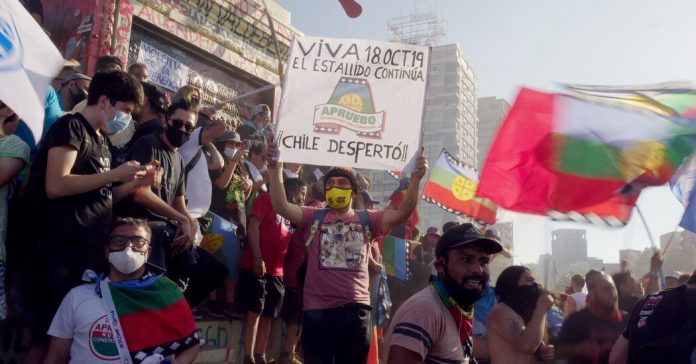Probably the most highly effective photos in “My Imaginary Nation” are of the demonstrations within the streets of Santiago, Chile, that started in October 2019. Lots of of hundreds of Chileans took to the streets, at first to protest a subway fare improve, and finally to demand sweeping modifications to the nation’s financial and political order. They had been met with tear fuel, baton costs and plastic bullets geared toward their eyes. Some fought again with cobblestones chiseled from the road, which they hurled on the police.
To observe scenes like that in a documentary movie — or, for that matter, on social media — is to expertise a robust sense of déjà vu. What occurred in Santiago in 2019 and 2020 seems like an echo, a reprise, of comparable uprisings within the latest previous; in Tehran in 2009 (and once more this week); in Arab capitals like Tunis, Damascus and Cairo in 2011; in Kyiv in 2014; in Paris on the peak of the Yellow Vest motion in 2018; throughout america in 2020. These episodes aren’t an identical, however every represents the eruption of long-simmering dissatisfaction with a established order that appears stubbornly detached to the grievances of the folks.
Accompanying the exhilaration that these photos may convey is a way of foreboding. In virtually each case, these rebellions led to defeat, disappointment, stalemate or worse. The buoyant democratic promise of Tahrir Sq. in Cairo has been smothered by a decade of army dictatorship. Ukrainian democracy, seemingly victorious after the Maidan “revolution of dignity,” has since confronted inside and exterior threats, most lately from Vladimir Putin’s military.
Jehane Noujaim’s “The Sq.” and Evgeny Afineevsky’s “Winter on Hearth” are wonderful in-the-moment movies about Tahrir and Maidan, and “My Imaginary Nation” belongs of their firm. But it surely additionally has a resonance particular to Chile, and to the profession of its director, Patricio Guzmán, who brings a novel and highly effective historic perspective to his nation’s current circumstances. He has seen occasions like this earlier than, and has cause to hope that this time is perhaps completely different.
Guzman, now in his early 80s, can pretty be described as Chile’s biographer, and in addition its cinematic conscience. His first documentary, footage from which seems on this one, was in regards to the early months of Salvador Allende’s presidency, which started in an environment of optimism and defiance in 1970 and led to a brutal U.S.-supported army coup three years later. Guzman’s account of Allende’s fall and the repression that adopted is the three-part “Battle of Chile,” which he accomplished whereas exiled in France, and which stands as one of many nice political movies of the previous half-century.
Extra lately, in one other trilogy— “Nostalgia For the Gentle,” “The Pearl Button” and “Cordillera of Desires” — Guzman has explored Chile’s distinct cultural and geographical identification, musing on the intersections of ecology, demography and politics in a mode that’s lyrical and essayistic. In “My Imaginary Nation” he cites the French filmmaker Chris Marker as a mentor, and so they share a spirit of important humanism and a behavior of searching for the that means of historical past within the superb grain of expertise.
Whereas this can be a first-person documentary, with the director offering voice-over narration, it expresses a poignant humility and a affected person willingness to pay attention. Guzman interweaves footage of the demonstrations into interviews with individuals, most of them younger and all of them girls.
This revolution, which culminated within the election of Gabriel Boric, a leftist in his 30s, to Chile’s presidency and a referendum calling for a brand new structure, arose out of the financial frustrations of scholars and dealing folks. However Guzman and the activists, students and journalists he talks to clarify that feminism was all the time central to the motion. They argue that the plight of poor and Indigenous Chileans can’t be understood or addressed with out taking gender under consideration, and that the equality of ladies is foundational to any egalitarian politics.
“My Imaginary Nation” ends with a brand new constituent meeting — together with many veterans of the demonstrations — assembly to write down a brand new structure that they hope will lastly dispel the legacy of Augusto Pinochet’s lengthy dictatorship. After the movie was accomplished, voters rejected their first draft, a setback to Boric and to the unconventional vitality Guzman’s movie captures and celebrates. Regardless of the subsequent chapter will likely be, we will hope that he’s round to file it.
My Imaginary Nation
Not rated. In Spanish, with subtitles. Operating time: 1 hour 23 minutes. In theaters.


